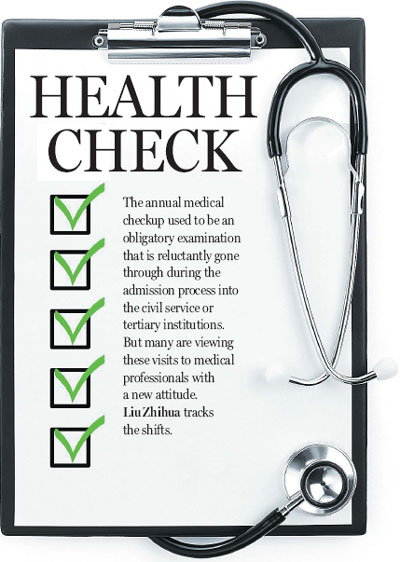Health check
The annual medical checkup used to be an obligatory examination that is reluctantly gone through during the admission process into the civil service or tertiary institutions. But many are viewing these visits to medical professionals with a new attitude. Liu Zhihua tracks the shifts.
It's the year's end and medical checkup facilities across the country are enjoying their busiest periods now. As the quality of living rises in China, those with deeper pockets and better awareness of health and wellness are more willing to invest in preventive medicine, especially the voluntary medical checkup.
"Medical checkups are part of staff welfare in my company. No one gives them up now," says Long Qichao, who works with a tourism investment company based in Wuhan, Hubei's provincial capital.
"Health matters a lot. Nowadays it is very expensive if you fall ill, and only early diagnosis can save both life and money. Besides, our company has already paid for the service."
The company Long works for has about 90 employees. In October, they all went to an exclusive high-end medical checkup center for a thorough physical examination.
For many like Long, medical checkups have become an important part of preventive healthcare.
According to Nanfang Daily, a report just released by a Beijing-based market research company says there are now more than 8,000 medical checkup facilities in China at the end of 2011.
Each year, about 100 million people go through medical checkups, and the market is worth about 10 billion yuan ($1.6 billion), with the demand increasing by 25 percent year on year, according to the report.
Han Xiaohong, founder and president of the Ciming Health Checkup Management Group, says: "When I started the first private medical checkup center in Chaoyang district, Beijing in 2002, people thought we were crazy to ask healthy people to lie down and get tested."
Han's company now runs a network of nearly 50 clinics across China and serves 2 million people annually.
Although she had the foresight to predict the trend, even she has been caught by surprise by its rapid development. "The change is beyond my expectation."
Han resigned from a famous military hospital to start her business in 2002. At that time, only the elite, such as high-ranking officials or influential academics, could afford and enjoy regular medical checkups, mainly subsidized by government.

















